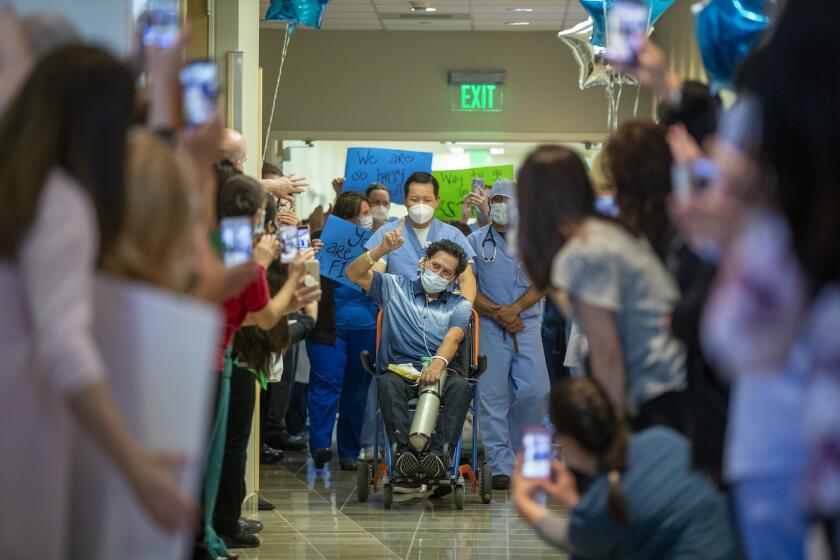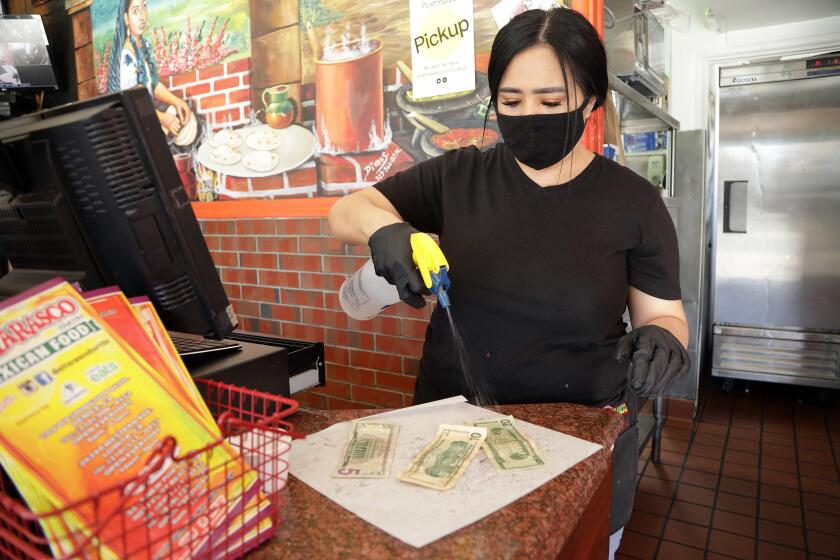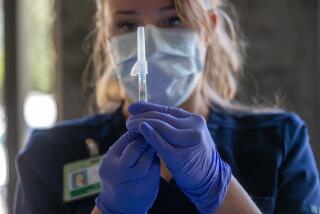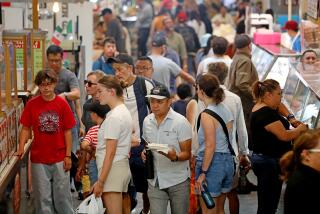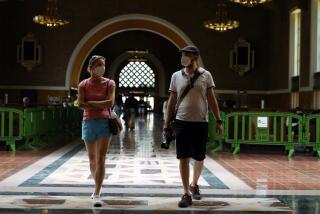Should you wear a mask at the grocery store? Coronavirus advice keeps changing
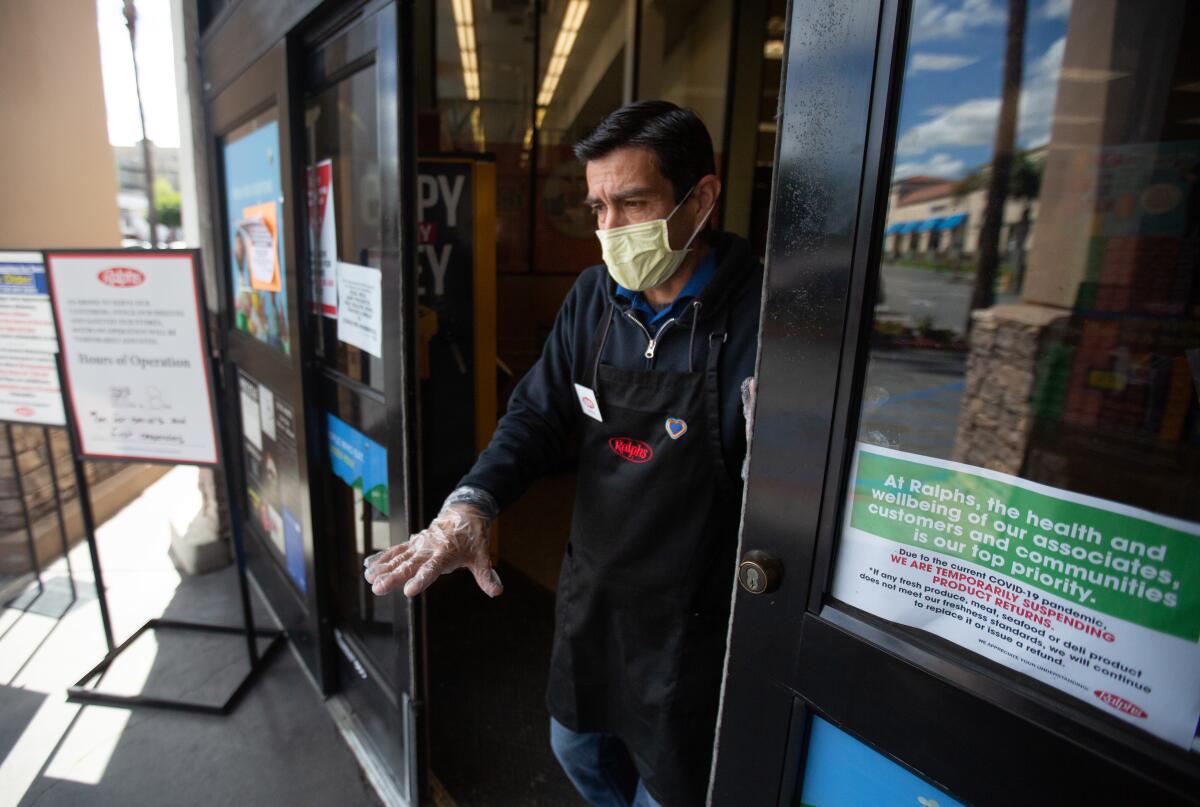
It’s time to wear face coverings when going to the grocery store, pharmacy or medical appointments.
That is the latest advice from L.A. Mayor Eric Garcetti and Riverside County health officials as they try to slow the spread of the coronavirus.
But it’s far from universal guidance. Federal officials maintain that healthy people do not need to wear masks in most circumstances, reflecting concerns that public demand for masks could deprive medical professionals of protection as they treat coronavirus patients.
Still, it seems to be a growing belief that more people should be covering their faces more often.
At an afternoon news briefing Wednesday, Garcetti said he had been awaiting advice from the U.S. Centers for Disease Control and Prevention on mask-wearing, but with the COVID-19 rate surging had decided to wait no longer.
The mayor said everyone performing essential tasks such as food shopping should wear homemade, non-medical face coverings, or even bandannas, as people in other COVID-19-struck countries have done.
“To be clear, you should still stay at home. This isn’t an excuse to suddenly all go out,” Garcetti said.
He added that people shouldn’t use medical-grade masks, which are in short supply and are needed by healthcare workers and first responders.
The mayor said even a “tucked-in bandanna” could slow the spread of the virus, and that masks remind people to keep their distance.
For his part, Gov. Gavin Newsom said Wednesday that face masks can augment, not replace the state’s physical distancing orders.
Riverside released the new mask guidance Tuesday, covering such essential tasks as grocery shopping and medical visits.
“The face coverings do not have to be hospital grade but need to cover the nose and mouth. For example, bandannas, fabric masks and neck gaiters are acceptable. Fabric covers and bandannas can be washed and used again,” the county said.
Officials said the recommendation is based on new knowledge about the coronavirus.
“When the situation changes, the rulebook changes,” Dr. Cameron Kaiser, Riverside County’s public health officer said in a statement. “We’re seeing our numbers increasing even sooner than we predicted and that means our strategy must change too.”
Lana Culp, a spokeswoman for the Department of Public Health in neighboring San Bernardino County, said there are several things to consider before making a mandate about masks, including a demand for supplies that already are short for healthcare providers.
Culp said the county is discussing the idea but worries it might send the wrong message: that it’s fine to ignore stay-at-home orders as long as your face is covered.
The recommendations haven’t spread across the state yet. Health officials in Fresno, Contra Costa and Kern counties said no such directives were being made there.
Pasadena spokeswoman Lisa Derderian said the city hasn’t issued similar guidance because it needs to reserve essential personal protective equipment for hospital workers.
“If the supplies become more readily available, or if there is more of a state [or] L.A. County directive, we will definitely evaluate at a local level,” she said.
Barbara Ferrer, director of the Los Angeles County Department of Public Health, cautioned the public against using N95 or surgical masks already in short supply for healthcare providers. But she said people can use a bandanna or piece of fabric to cover their nose and mouth when going to the grocery store or otherwise out in public.
“Wearing a mask is not a shield,” she said, adding that it does not replace frequent hand washing and physical distancing efforts.
Officials urged residents to stay at home whenever possible and respect social distancing mandates when they must be in public. These efforts more than anything, they said, will help ensure there isn’t excessive strain on the county’s healthcare system.
The CDC has said that healthy people who do not work in the healthcare sector and are not taking care of an infected person at home do not need to wear masks.
“Face masks may be in short supply, and they should be saved for caregivers,” the government agency said.
Many hospitals are facing a shortage of tight-fitting masks that filter out about 95% of small airborne particles. This has forced healthcare professionals to either reuse masks or switch to standard surgical masks, which do not block airborne particles as effectively.
As healthcare workers are forced to limit or reuse personal protective equipment, and in some cases, make do with makeshift accommodations, donations pour in.
But in recent days, the CDC has been weighing whether to modify its recommendations and endorse the use of homemade masks.
“I can tell you that the data and this issue of whether it’s going to contribute [to prevention] is being aggressively reviewed as we speak,” Dr. Robert Redfield, the CDC director, told NPR.
These are some of the unusual new scenes across the Southland during the coronavirus outbreak.
Some experts say there are times when wearing a surgical mask, homemade face covering or bandanna might be a good idea.
Chunhuei Chi, director of the Center for Global Health at Oregon State University, noted that in Taiwan, people are required to wear surgical masks in places such as schools and restaurants and while riding public transportation.
Although surgical and homemade masks don’t filter out particles as effectively as N95 masks, Chi said they can still be useful.
He recommends wearing a mask only if you have to be in close contact with people, such as riding a crowded bus.
“If you are going out for a hike or walk and there are very few people around, you do not need a mask,” he said.
Dr. Otto Yang, an infectious diseases expert at UCLA, said there’s no need for a healthy person to don a mask for something like a trip to the grocery store.
“I agree with what the CDC says about there not being a role for masks for protecting yourself if you’re just out in the regular public,” Yang said. “It’s more about protecting the people around you in case you are infected.”
Yang said a face mask captures the infectious materials released when a person coughs or sneezes, thus preventing people nearby “from being contaminated” and keeping the virus off high-touch surfaces such as doorknobs and handrails.
Homemade masks will not block virus particles if you spend a lot of time in close proximity to someone who is sick, but they will protect you from droplets containing the virus. That should be adequate for people who do not need to have close contact with those who are infected, Chi said.
Polypropylene fabric is best to use if you can get your hands on it. It’s the material that is used in surgical masks, he said.
The Associated Press contributed to this report.
Los Angeles Times’ visual coverage of the coronavirus crisis
More to Read
Sign up for Essential California
The most important California stories and recommendations in your inbox every morning.
You may occasionally receive promotional content from the Los Angeles Times.
